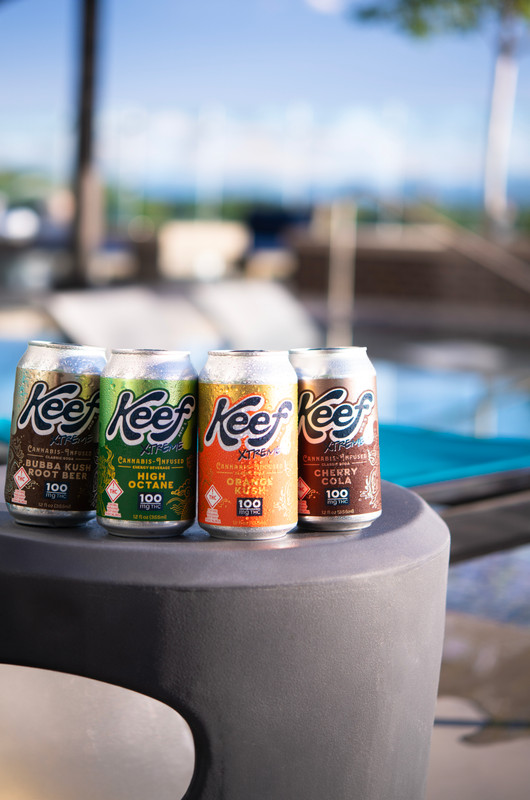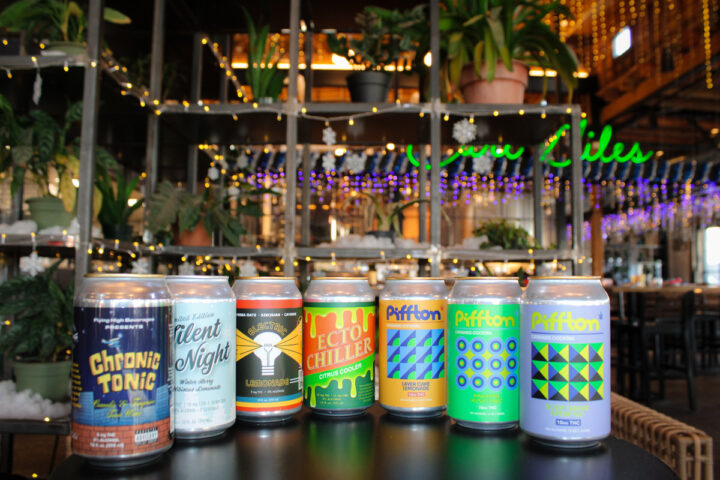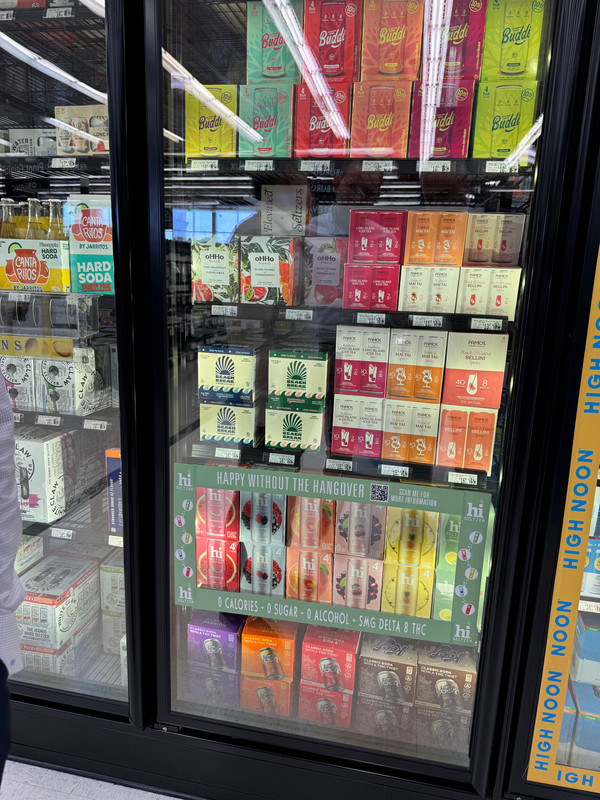
The cannabis drinks market continues to see dramatic and rapid change as regulatory constraints remain in constant flux and new products flood the market. Despite ongoing legislative challenges however, cannabis drinks are booming. The segment is enjoying meteoric growth at retail and increasing interest on-premise thanks to consumers from all walks of life embracing hemp-derived THC beverages nationwide. It’s a true turning point for what many still consider to be an emerging drinks segment with a long runway for growth, and the future continues to look bright.
“Cannabis and hemp-derived beverages are both in active growth phases,” says Blake Patterson, chief revenue officer for category trailblazer Keef Brands. “The hemp space has exploded as new markets and retail channels recognize the value and performance of these products. We’re experiencing some of the strongest growth we’ve seen in our 15-year history.”

Keef launched in 2010 in Boulder, Colorado with THC-infused sodas and the company now offers a full lineup of products. The Keef portfolio spans from high-dose sodas and mocktails ranging from 100-mg. to 500-mg., which are only available in dispensaries in 12 regulated cannabis markets, to low-dose hemp-derived THC sodas in 5-mg. and 10-mg. potencies, which are sold in liquor and convenience stores in 12 additional markets. Keef’s top-selling SKU is its Bubba Kush Root Beer, and its popular soda line also includes the flavors Orange Kush, Original Cola, Blue Razz, and Purple Passion (low-dose cans start at $5 each, while high-dose products are $15-$20 each).
“Our hemp-derived, low-dose beverages are designed for accessibility and broad appeal,” Patterson says. “We’re working to educate retail channels like c-stores on the category and our brand. The social nature of a beverage is perfectly suited for cannabis consumption. It’s a great entry point for new consumers and a convenient option for experienced users.”
Access And Education
The primary barriers to expansion for all cannabis drinks stem from a lack of awareness and education—both among consumers and the trade—and in turn, access to retail channels that make sense. Most cannabis drinks producers say that for the category to reach its true potential, their products need to be stocked in stores that sell other beverage categories, predominantly alcohol.
“Consumers in different markets are in different stages of understanding the category, but once they try it they catch on quickly,” Patterson says. “In order to reach more audiences, cannabis beverage companies need access and education, and the convergence of the two is happening in real time, market by market, retailer by retailer. We don’t seek to be and never will be a replacement for alcohol. We’re happy to share space on trucks, shelves, and with consumers.”
Jake Bullock, the co-founder and CEO of Cann—a “social tonic” that has retail placement in 30 states, plus more online—agrees that getting full acceptance in liquor stores will be the key turning point. One of Cann’s primary partners is Total Wine & More, and the brand is available in the mega beverage retail chain’s stores in 20 states. Cann was a pioneer in micro-dose

THC, offering a full roster of products with 2-mg., 5-mg., or 10-mg. doses of hemp-derived THC, many of which also incorporate CBD. The popular 12-packs of 8-ounce cans of 2-mg. THC and 4-mg. CBD drinks are $66 online and are available in flavors like Blood Orange Cardamom, Lemon Lavender, and Grapefruit Rosemary. Cann offers the same flavors in a 0.8-ounce shot format called Roadies, which are packaged in pouches and designed for portability and mixability into other drinks. The liquid shot packets now make up 20% of Cann’s total business.
“The biggest constraint today is that alcohol sells most in grocery stores and we don’t sell there,” Bullock says, adding that many grocers are more cautious than dedicated beverage alcohol retailers. He adds, though, that retailers like Circle K, Winn-Dixie, and Stew Leonard’s are making moves in the space and adding a few cannabis drinks products in their stores. “I believe this category can be as large as beer—we can get there,” Bullock continues. “THC drinks can be a multi-billion-dollar industry in the next year or two. Grocery retail is the inflection point that will blow the top off this.”
Cann believes that a lower dose of cannabis is a big selling point, especially with newer consumers who aren’t veteran cannabis users. Bullock describes his products as sessionable and sociable, and says that the brand’s consumer base is wide, ranging from the 65-plus community to millennials to the generation that just turned 21 and 22 years old. In addition, increasing partnerships with major players in the beverage alcohol space are creating opportunity.
“Alcohol wholesalers and retailers are working with us,” Bullock explains. He notes that, as alcohol consumption slumps, wholesalers are filling holes in their trucks that used to be stocked with beer and spirits with cannabis drinks instead, and he adds that alcohol retailers are doing the same—adding cannabis drinks to attract a new set of consumers to their stores.
To supplement this, the next wave for evolution in cannabis drinks is better regulation, Bullock says. He calls on legislators to implement a regulatory framework that allows for safe products but bans the unsafe ones. “As an industry, we need to figure out how to get rid of dangerous synthetic products that are modeled after candy and snacks and are way too potent,” he explains. “Cann is an adult beverage that uses a different intoxicant. It should be regulated like existing adult beverages.”
All About Trust
For Angus Rittenburg, the co-founder and CEO of Wynk, trust is a key issue, and with trust comes awareness. Like his peers, Rittenburg points to the unfortunate companies who are bringing the overall cannabis market down—the high-potency gummies branded like candy and the irresponsible products that further stigmas instead of nurturing the category. “There’s a lot of legacy stigma we’re trying to overcome to educate consumers that our products are safe,” Rittenburg says. “We need to get our products into licensed and legitimate alcohol retailers—into trusted bars and liquor stores. When people see the products there, they know these establishments and trust them. We’re also working to get these products concessioned at trusted venues like sports arenas and music venues, getting them in people’s hands in places where they’re having fun.”
Wynk is uniquely positioned as a zero-calorie, zero-sugar beverage and is available in 2.5-mg., 5-mg., and 10-mg. THC doses. The portfolio includes lightly flavored seltzers that contain both THC and CBD, as well as lemonades with THC only (products range from $25-$36 for 4- and 6-packs of 12-ounce cans, depending on the potency). Along with online availability in 40 states, Wynk is sold at retail in 20 markets, and Rittenburg points to beverage bigwigs like Total Wine, Binny’s in Chicago, and Bottle King in New Jersey as being successful partners. He expects to add a few more markets by the end of 2025.
To further increase awareness and expand availability, Rittenburg is lobbying both federally and at the individual state level. “In our best markets, we’re maybe actively selling in 15% of the account base,” he says. “Making regulations clearer so retailers and distributors are more comfortable will unlock huge expanded distribution. Most of our effort is in education in the legislature on what a good pathway for this category is and what good regulations should look like.”

But even so, Rittenburg is optimistic. “The landscape for cannabis drinks today is better than it’s ever been,” he says, noting that the drinks are available through major wholesalers and distributors, and that they’re being embraced both off- and on-premise. “This is the most opportunity I’ve ever seen for THC drinks. Growth is faster than it’s ever been. For Wynk, I’d say the perfect world is one where you can buy High Noon and Wynk side by side.”
Brēz is a relative newcomer in the cannabis drinks space, having launched in 2023, but it’s already seeing wide success. CEO and founder Aaron Nosbisch says the brand generated $28 million in revenue in 2024 and $13 million in just the first quarter of 2025, and he expects to meet or exceed $50 million in revenue by year-end. “We’ve watched cannabis beverages evolve from a curiosity into a large-scale movement, largely because of a cultural shift towards conscious consumption,” Nosbisch says. “We’ve seen the market mature significantly, both in terms of innovation and consumer education.”
Brēz is sold in more than 2,000 retail stores nationwide, including in larger players like Total Wine, Wegmans, and Sprouts Farmers Market, and online through its own website, Amazon, and DoorDash. The brand portfolio includes THC drinks in 2.5-mg., 5-mg., and 10-mg. doses, and many of the products also contain CBD and functional adaptogens like lion’s mane. The products range from $40 for an 8-pack of 12-ounce cans to $69 for a 750-ml. bottle of Spirit, the brand’s zero-proof THC and CBD spirits offering.
“Cannabis drinks aren’t competing with alcohol, they’re creating a whole new category of social drinking,” Nosbisch says. “Alcohol will always have its place, but we’re proving that cannabis beverages deserve a seat at the table as well. We’re definitely at the point where the early adopters get it, and the mainstream is catching on too. The perception has changed dramatically. Cannabis used to be used in secrecy and now it’s on cocktail menus and dinner party tables. It’s being approached with the same intentionality and creativity as craft beer and natural wine.”
Making Moves
Gaining widespread acceptance is indeed crucial to further growth for cannabis drinks. In the alcohol world, exposure in restaurants and bars is often the first step for new brand launches, but the on-premise remains a hurdle for cannabis drinks. Some bars and restaurants are working to change that, though. In Minneapolis, Earl Giles Restaurant and Distillery does double duty—the distillery side produces a full roster of THC drinks and the restaurant side promotes them. The company also makes spirits like vodka, gin, and rum, and several non-alcohol mixers and syrups. The Earl Giles THC portfolio includes 10-mg. THC and CBD drinks ranging from a hibiscus lemonade to a Nordic Spritz to a tropical ginger beer ($8-$12 a 12-ounce can on-premise).
Earl Giles CEO Nick Kosevich calls cannabis drinks the most exciting new beverage segment in decades and says they’re showing the “most insane growth” he’s seen across the distillery and restaurant business. “It’s the fastest growing piece of our business and a very exciting market to be in,” Kosevich says. As a distiller and producer, he notes that his THC portfolio is sold in liquor stores, gas stations, grocery stores, and dispensaries in Minnesota and South Dakota, but he adds that the restaurant space in both states has not taken off like the retail sectors. At Earl Giles restaurant, alcohol comprises 75% of beverage sales and THC drinks make up 20%, with non-alcohol drinks holding the remaining 5%.
Cannabis drinks aren’t taking share from alcohol at his bar, Kosevich says. “People aren’t drinking less liquids, just less alcohol,” he explains. “People come in who were already not going to drink alcohol, so the fact that we offer THC moved them from a non-alcohol beverage to a THC one. We’ve seen 20% growth in cannabis drinks this year on-premise.” Going forward, innovation at Earl Giles will include spirits-style THC products that can be used in mixology and a line of offerings that include adaptogens like ashwagandha, ginseng, lion’s name, and rishi.
In Cincinnati, cannabis drinks are embraced at Rusk Kitchen + Bar. General manager Brian McVey says the category has evolved in both flavor and demand, and he notes that his venue goes through about three cases of THC seltzers a week. While pre-canned seltzers have been his focus—the bar does well with the Sunflower brand—McVey adds that this fall the restaurant plans to introduce cannabis-infused cocktail mixers—like those made by Black Market—for use in mixed drinks.

“At one time, cannabis drinks were slightly taboo,” McVey says. “But now, especially in our part of the world, it’s expected to see at least one cannabis drink offering in nearly every restaurant and bar you go to.”
While the on-premise continues its slow build of acceptance for cannabis drinks, the off-premise remains steady in promoting the category. At the 200-plus unit Spec’s Wines, Spirits & Finer Foods chain in Texas, cannabis drinks are seeing huge gains. The company stocks nine brands and upwards of 95 total items now and plans to add several more brands before the end of the year to meet consumer demand.
“It went from being not a category to probably the most bullish category we’ve carried,” says Spec’s head of procurement Steve Jabour. “It’s the fastest growing space I’ve ever seen.”
Jabour says cannabis drinks are posting 20% growth month over month at Spec’s. The stores carry hemp-derived products at 10-mg. a can or less, led by brands like Buddi, OhhO, Plift, Lolli, Keef, and Pamos. Texans frequently see bills introduced in their state legislature to ban cannabis use, but so far such proposals have been voted down or vetoed by Governor Greg Abbott. While Jabour fully supports selling cannabis drinks, he does want to see better regulation, including age dating and milligram caps on single-serve products.
“The perception of cannabis drinks here is good,” Jabour says. “They’re in a Spec’s store with thousands of other products and people don’t have to go to a dispensary, which helps them understand the category. There’s so much runway for growth, we haven’t even scratched the surface yet.”
The scene is similar at Top Ten Liquors in Minneapolis. The 15-unit retail store company has seen huge growth in cannabis beverages, and CEO and owner Jon Halper, a Market Watch Leader, describes the category as electric. Across all stores, his company carries more than 300 hemp-derived THC beverage SKUs, ranging from single-serve cans and multi-packs to shots and dissolvable powders. Cannabis drinks and edibles make up 15% of sales for the company now, and the category is doing so well at Top Ten that Halper has plans to open a new hybrid retail concept next year that puts a heavy emphasis on THC alongside top-selling beverage alcohol products.
“In the past year we’ve seen cannabis drinks move from curiosity to relevance—they’re now part of the adult beverage conversation,” Halper says. “It’s become part of our core offering. The growth is consistent, repeat purchases are strong, and customer energy around the category is growing. As the legal environment normalizes and more brands enter the space, we’re getting better products, more variety, and better retail tools. The category is dynamic and only going to get bigger. We’re just getting started.”